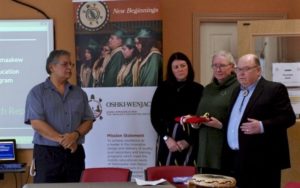Successes of Oshki Wenjack program designed to improve school success of young Indigenous students outlined in recent report

By Rick Garrick
THUNDER BAY — The successes of Oshki-Pimache-O-Win The Wenjack Education Institute’s Indigenous Early Childhood Education Professional Development Program were outlined during the release of the Final Summative Research Report on Mar. 5 in Thunder Bay.
“The most important finding was those participants in the project literally went back to their communities and put into action everything they learned,” John Hodson, director of Maamaawisiiwin Education Research Centre and one of the researchers involved with the research report. “So what they learned on Sunday, they put into action on Monday. We calculated something like $500,000 just as one example. When they started studying how to write a funding application, they did and took it back and something like $500,000 worth of new funding came into Early Childhood Education in those communities we worked with.”
Another success stemming from the Professional Development Program was that about eight of the graduates are now pursuing further education through Oshki’s Bachelor of Education program offered in partnership with Brock University.
“I want to be a teacher — I want to teach children from my community,” says Tracy Dore, a Professional Development Program graduate from Ginoogaming in Nishnawbe Aski Nation. “Right now, our community goes to the school in town, so I would like to be a teacher at one of the schools in town so I’d be able to teach our children.”
Dore, who has worked at the Ginoogaming Aboriginal Head Start Program for many years, says it was also important to be a role model for children and youth in her community.
“I’m at college, now the leadership, now I’m going to have a university degree,” Dore says. “Without Oshki and having the module program here and offering this, I probably wouldn’t have left my community to move to the city [to study for many years]. I have children, grandchildren at home, I have a home, I have everything — so I’m so glad for Oshki to be offering these courses through a module program.”
Oshki launched the Professional Development Program, which was a two-year educational innovation designed to increase the leadership capacities of Indigenous and non-Indigenous Early Childhood Educators (IECEs) working in a First Nation and Indigenous urban context in northwestern Ontario, in 2017 with about 50 IECEs in attendance from 17 First Nations. The program was developed from the recommendations of a Needs Assessment Talking Circle held with a group of IECEs.
“This in-service Professional Development Program was the first in a number of strategic initiatives designed to improve the school success of Indigenous children and youth across the territories,” says Gary Bruyere, acting executive director at Oshki. “One of the things I was really pleased to hear about it is that the outcomes of this project were not found in mainstream curriculum in the ECE programs, nor from what I understand within the Indigenous ECE programs with the regular postsecondary [institutions].”
Hodson says the research report included recommendations for the establishment of an Oshki-Wenjack Centre for Indigenous Education Research and an Oshki-Wenjack Centre for Professional Teacher Development.
“It’s time for Oshki, we believe, to look at doing things in a big way and becoming the voice of Indigenous education by two initiatives,” Hodson says. “One of things that we suggested/recommended, and these are up to Oshki to consider, is the creation of a centre for Indigenous research. And the other one is a department of professional development that would do outreach to the boards of education and faculties of education and/or schools to help those teachers, predominantly non-Indigenous educators, to be more successful in their approaches with our children.”

